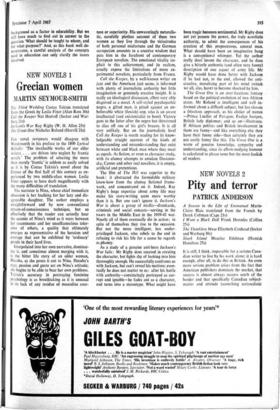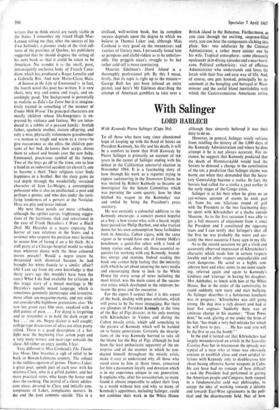NEW NOVELS 2
Pity and terror
PATRICK ANDERSON
A Season in the Life of Emmanuel Marie- Claire Blais translated from the French by Derek Coltman (Cape 21s) 1 Want a Black Doll Frank Hercules (Collins 25s) The Thankless Muse Elizabeth Coxhead (Seeker and Warburg 30s) Shark Island Maurice Edelman (Ha mish Hamilton 25s)
It is still, I think, impossible for a serious Cana- dian writer to live by his work alone; it is hard enough, after all, to do this in Britain. An even more serious problem arises from the fact that American publishers dominate the market, that success is almost always success south of the border and that specifically Canadian subject- matter and attitude (something nationalistic
writers like to think exists) are rarely viable in the States. I remember my friend Hugh Mac- Lennan telling me that, after the success of his Two Solitudes, a pioneer study of the rival cul- tures of the province of Quebec, his publishers suggested that he should disguise the setting of his next book so that it could be taken to be American. No wonder it is the small, poor, intransigently exclusive body of French Cana- dians which has produced a Roger Lemelin and a Gabrielle Roi. And now Marie-Claire Blais.
A Season in the Life of Emmanuel is in fact, the fourth novel this poet has written. It is very short, very wry and comic and tragic, and ex- ceedingly good. The background is potentially as realistic as Zola's La Terre but it is imagina- tively treated in something of the manner of Under Milk Wood. The principal characters are mostly children whose life-hungriness is ex- pressed by violence and fantasy. We are intro- duced to a rabble of a peasant family : brutish father, apathetic mother, sixteen offspring, and only a wise, physically voluminous grandmother —a woman as tough and warm as a stove—to give reassurance as she allots the children por- tions of her bed, de-louses their scalps, drives them to school and broods over the new baby, Emmanuel, precarious symbol of the future. Two of the boys go off to the town, one to lose a hand in an industrial accident (at eleven!), one to become a thief. Their religious sister finds happiness in a brothel. But the story gains its real depth through the wonderfully sustained character of Jean Le-Maigre, a consumptive pubescent who is also an intellectual, a poet and perhaps a genius, and who dies under the terri- fying tenderness of a pervert at the Noviciat. Here are pity and terror indeed.
My next three novels are more orthodox, although the epithet carries frightening sugges- tions of the factitious, slick and sensational in the case of Frank Hercules's / Want a Black Doll. Mr Hercules is a negro exposing the horror of race relations in the States and a reviewer who respects his position must hesitate to accuse him of laying it on a bit thick. At a staff party at a Chicago hospital would no white man whatever dance with the three coloured nurses present? Would a negro intern be threatened with dismissal because he had brought his white fiancee to a similar affair? (All I can say from my own knowledge is that thirty years ago this wouldn't have been the case.) What I do find available for criticism in this tragic story of a mixed marriage is Mr Hercules's equally mixed language, which is sometimes genuinely picturesque and inventive, more often sex-magazine-manic, and not with- out considerable highbrow pretensions also: 'He saw her green eyes film over, oxydised with a dull patina of pain. . . . For dying is forgetting and to remember is to hold the dark crypt at bay . . .' etc. etc. Negro dialect is well caught; college-type discussions of ideas are often pretty stilted. There is a good description of a fist- fight near the beginning (fast action pop) and a very nasty torture and near-rape towards the close. All rather an angry jumble, I fear.
Very different is Miss Coxhead's The Thank- less Muse. One breathes a sigh of relief to be back in Bowen-Lehmann country. The subject is the ruthless egotism of genius. Thomas Laker, a great poet, spends part of each year with his mistress Clare, who is a gifted painter, and her more practical sister, who keeps the house and does the cooking. The arrival of a clever adoles- cent niece, devoted to Clare and initially con- temptuous of Laker, complicates matters. In the end the poet commits suicide. This is a civilised, well-written book, but its complete success depends upon the degree to which we believe in Thomas Laker and, although Miss Coxhead is very good on the meannesses and vanities of literary men, I personally found him so pompous and cliche-ridden as to be unbeliev- able. The priggish niece's struggle to be her rather cold self is more convincing.
Maurice Edelman's Shark Island is a thoroughly professional job. By this I mean, firstly, that its topic is right up to the minute— George Raft has just been refused an entry permit, and here's Mr Edelman describing the attempt of American gamblers to take over a
British island in the Bahamas. Furthermore, as you race through the exciting, suspense-filled story, you can hear the components clicking into place. Sex : two adulteries by the Colonial Administrator, a rather more sinister one by his wife. Tropical atmosphere: some pleasantly opalescent skin-diving episodes and a near-hurri- cane. Political authenticity : visit of officious Administrator who understands and loves the locals with their free and easy way of life. And, of course, one gets hooked, principally by re- sentment at the bungling and betrayal at West- minster and the awful bland inevitability with which the Castro-conscious Americans arrive.































 Previous page
Previous page